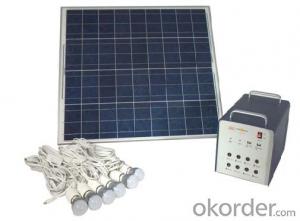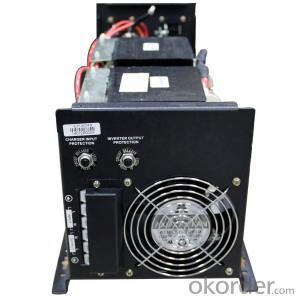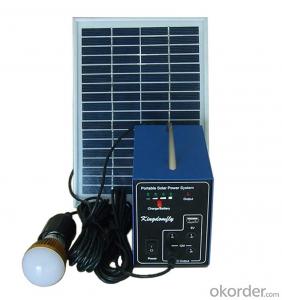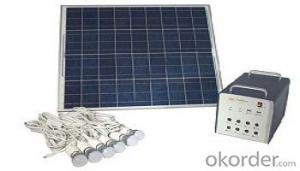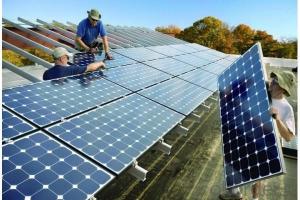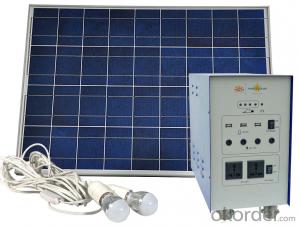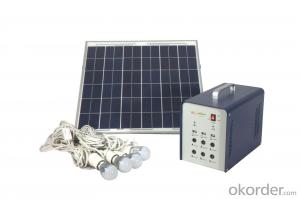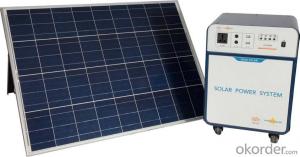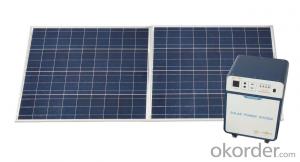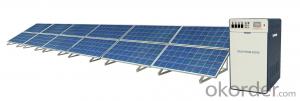Solar Energy Systems Brampton Home Off-Grid Solar Power System DC Lighting JS-SPS-300C
- Loading Port:
- Tianjin
- Payment Terms:
- TT OR LC
- Min Order Qty:
- 10 set
- Supply Capability:
- 10000 set/month
OKorder Service Pledge
Quality Product, Order Online Tracking, Timely Delivery
OKorder Financial Service
Credit Rating, Credit Services, Credit Purchasing
You Might Also Like
Off-grid Solar Power System
General Introduction
Solar power system provides alternating current and direct current, which is produced by the modules transforming solar power into power, to home lighting, household appliance and other DC appliance, such as cell phone and laptop.
Solar power system is widely used in area lack of power, for example house power supplying, monitoring, communication base, fire prevention in forest area, pasture and meadow, aquaculture etc.
We are dedicated to provide high quality off-grid PV products and systems to customers and has received a series of certificate, including ISO9001, TUV, UL, CE, CQC and RoHS.
Solar DC Lighting System
Multiple protection system, safe and reliable performance.
Integrated and portable design, easy operation.
DC5V, DC12V, AC220V output, wide range application.
Clean engergy, cycle use.
General Introduction
Solar power system provides alternating current and direct current, which is produced by the modules transforming solar power into power, to home lighting, household appliance and other DC appliance, such as cell phone and laptop.
Solar power system is widely used in area lack of power, for example house power supplying, monitoring, communication base, fire prevention in forest area, pasture and meadow, aquaculture etc.
We are dedicated to provide high quality off-grid PV products and systems to customers and has received a series of certificate, including ISO9001, TUV, UL, CE, CQC and RoHS.
Solar DC Lighting System
Multiple protection system, safe and reliable performance.
Integrated and portable design, easy operation.
DC5V, DC12V, AC220V output, wide range application.
Clean engergy, cycle use.
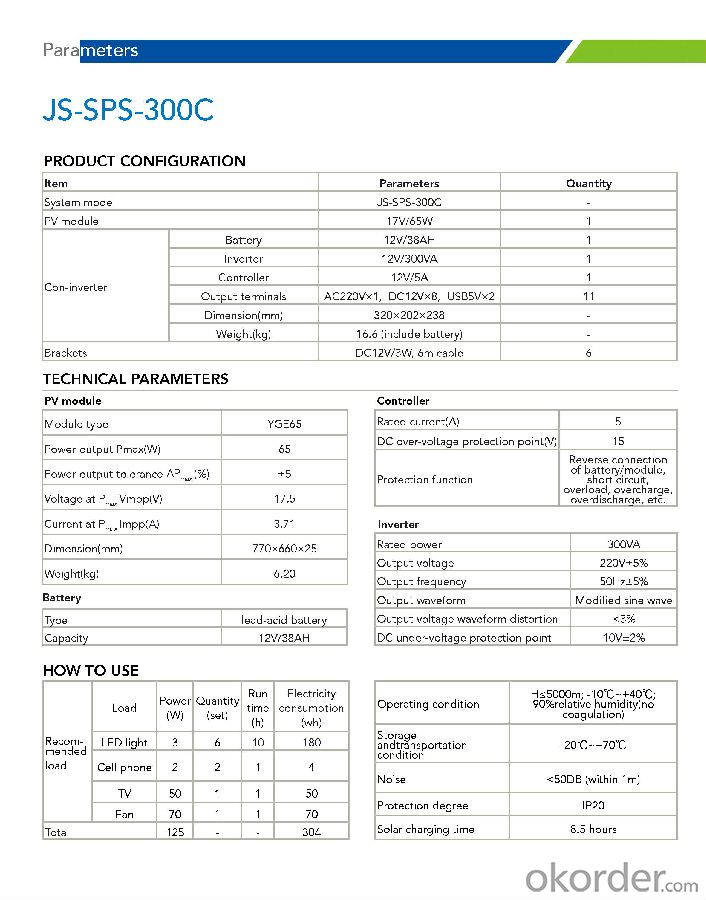
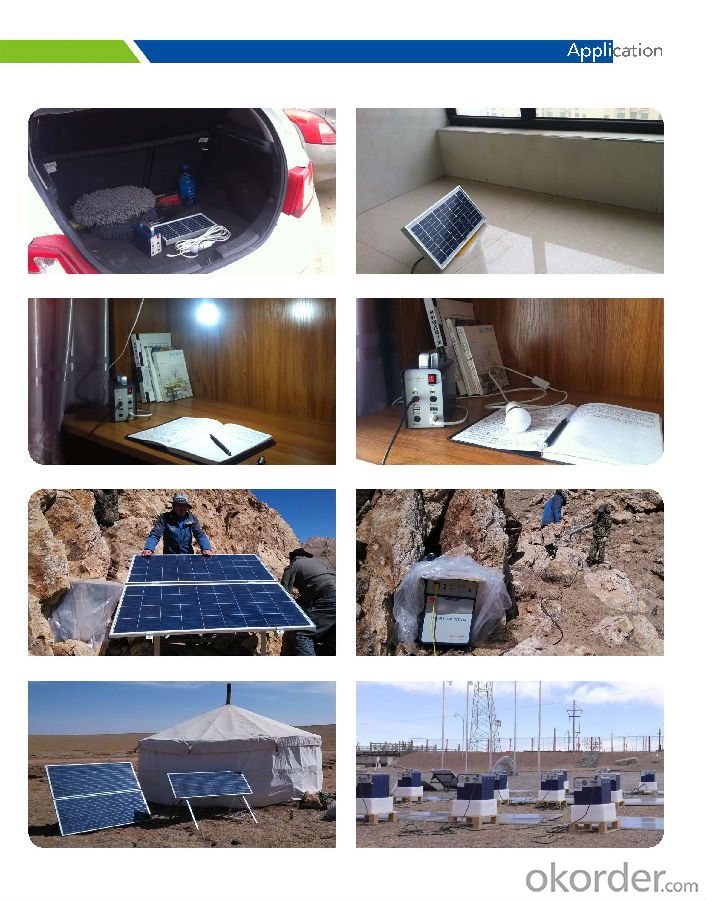
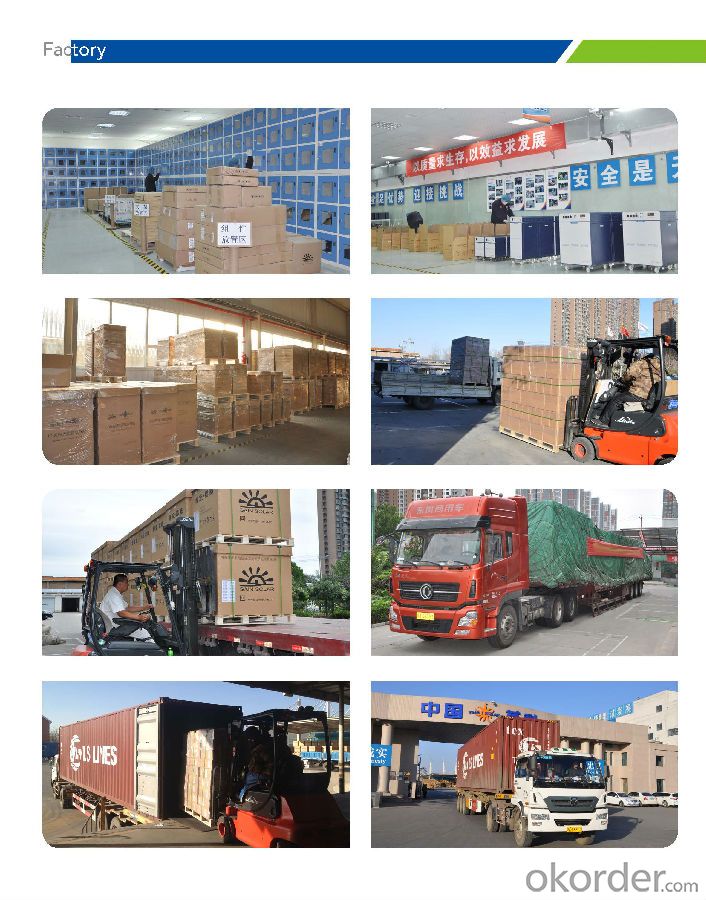
- Q: What is the installation process for a solar energy system?
- The installation process for a solar energy system typically involves several steps. Firstly, a site visit is conducted to assess the roof or ground space for solar panel placement and to determine the solar potential of the location. Then, the necessary permits and paperwork are obtained from the local authorities. Next, the solar panels and related equipment are installed, which includes mounting the panels, connecting the electrical components, and setting up the inverter to convert the DC electricity generated by the panels into usable AC electricity. Finally, the system is inspected and connected to the grid or battery storage, and the homeowner or business owner is educated about the system's operation and maintenance.
- Q: How do solar energy systems handle excess power generation?
- Solar energy systems handle excess power generation in a few different ways. One common method is through net metering, where any excess electricity produced by the solar panels is sent back to the grid and the homeowner or business owner receives credits for that excess power. Another approach is to store the excess energy in batteries, which can then be used during times when the solar panels are not generating enough power, such as at night. Additionally, some solar energy systems are designed to automatically adjust the tilt or orientation of the panels to reduce power generation when it exceeds the demand.
- Q: How do solar energy systems contribute to reducing peak demand on the electrical grid?
- Solar energy systems contribute to reducing peak demand on the electrical grid in several ways. Firstly, during sunny days, these systems generate electricity from the sun, which can be directly used by homes and businesses, reducing their reliance on the grid. This decreases the overall demand on the grid during peak times. Additionally, excess solar energy generated during the day can be stored in batteries or fed back into the grid, providing a supplemental power source during peak demand periods. This helps to balance the load on the grid and reduces strain on conventional power plants, leading to a more stable and reliable electrical grid.
- Q: Can solar energy systems be used in conjunction with energy storage systems?
- Yes, solar energy systems can be effectively used in conjunction with energy storage systems. Solar energy systems generate electricity during daylight hours, and any excess energy generated can be stored in energy storage systems such as batteries. These batteries can then be used to power homes or businesses during periods when solar energy generation is limited, such as at night or during cloudy weather. This combination of solar energy systems and energy storage systems allows for a more consistent and reliable supply of electricity, reducing dependence on the grid and promoting greater sustainability.
- Q: Can solar energy systems be used for powering medical equipment in remote areas?
- Yes, solar energy systems can be used for powering medical equipment in remote areas. Solar panels can generate electricity from sunlight, which can be stored in batteries for later use. This renewable energy source is reliable and can provide power to medical equipment, such as refrigerators for storing vaccines, diagnostic machines, lighting, and other essential devices, even in areas without access to the grid. Solar energy systems are a sustainable solution that can greatly improve healthcare access and outcomes in remote regions.
- Q: Can solar energy systems be used for powering electric gates?
- Yes, solar energy systems can be used to power electric gates. Solar panels can generate electricity from sunlight, which can be used to operate electric gates. This renewable energy source is ideal for remote locations or areas with limited access to the power grid.
- Q: What is the role of solar charge controllers in regulating the charging of batteries?
- The role of solar charge controllers is to regulate the charging of batteries by managing the flow of electricity from the solar panels to the batteries. They ensure that the batteries are charged efficiently and safely by monitoring the voltage and current levels, and adjusting the charging parameters accordingly. This prevents overcharging, which can damage the batteries, and also protects against over-discharging, which can shorten their lifespan. Solar charge controllers act as a crucial intermediary between the solar panels and batteries, optimizing the charging process to maximize the battery's performance and longevity.
- Q: What is the impact of air pollution on the performance of solar panels?
- Solar panel performance can be significantly affected by air pollution. One of the main ways in which it affects them is by diminishing the amount of sunlight that reaches the panels. Sunlight can be scattered and absorbed by air pollution, such as smog and particulate matter, resulting in a decrease in the solar energy absorbed by the panels. This, in turn, reduces the overall efficiency and power output of the panels. Furthermore, a layer of dust, dirt, and other pollutants can be deposited on the surface of solar panels due to air pollution. This layer obstructs and absorbs sunlight, further reducing the amount of energy that can be collected. Additionally, the accumulation of these pollutants acts as a barrier that hampers the transmission of sunlight to the solar cells, thus decreasing the panels' efficiency. Moreover, air pollution can cause the corrosion of solar panel surfaces. Pollutants like sulfur dioxide and nitrogen oxides can react with moisture in the air, forming acidic compounds. Over time, these compounds gradually deteriorate the protective coatings on the panels and damage the cells, leading to a reduction in performance and lifespan. Overall, the impact of air pollution on solar panels is significant. It diminishes the amount of harvested sunlight, lowers the efficiency and power output of the panels, and can cause damage and deterioration over time. Therefore, it is crucial to consider the effects of air pollution during the design and installation of solar panels to ensure optimal performance and longevity.
- Q: How do solar energy systems impact the carbon footprint of a home?
- Solar energy systems have a significant positive impact on reducing the carbon footprint of a home. By harnessing the power of the sun to generate electricity, solar energy systems produce clean and renewable energy, resulting in a significant reduction in greenhouse gas emissions. Conventional electricity generation relies heavily on fossil fuels such as coal, oil, and natural gas, which release carbon dioxide and other harmful pollutants into the atmosphere. These emissions contribute to global warming and air pollution, leading to adverse health effects and environmental degradation. In contrast, solar energy systems produce electricity without any emissions or air pollution. The photovoltaic cells in solar panels convert sunlight into electricity directly, without the need for combustion or any harmful byproducts. As a result, solar energy systems eliminate greenhouse gas emissions and reduce the reliance on fossil fuels. By utilizing solar power, homeowners can significantly decrease their carbon footprint. The amount of carbon dioxide emissions avoided depends on the size and efficiency of the solar energy system, as well as the amount of electricity consumed. However, on average, a typical residential solar energy system can offset approximately 15,000 pounds of carbon dioxide emissions per year. This is equivalent to planting around 150 trees annually or driving a car for 10,000 miles. Moreover, solar energy systems can help homeowners achieve energy independence and reduce their reliance on the electrical grid. By generating their own clean electricity, homeowners can reduce the demand for fossil fuel-based energy sources, further reducing carbon emissions on a larger scale. In summary, solar energy systems have a transformative impact on the carbon footprint of a home. They offer a sustainable and environmentally friendly alternative to conventional electricity generation, reducing greenhouse gas emissions and mitigating climate change. Installing solar panels not only helps homeowners save money on electricity bills but also contributes to a cleaner and healthier planet for future generations.
- Q: How does a solar thermal system convert sunlight into heat?
- A solar thermal system converts sunlight into heat through the use of solar collectors. These collectors, often made of glass, capture the sun's rays and transfer the energy to a heat transfer fluid or directly to water in the system. The fluid or water then carries the heat to a storage tank or heat exchanger, where it can be used for various purposes such as heating water, spaces, or even generating electricity.
Send your message to us
Solar Energy Systems Brampton Home Off-Grid Solar Power System DC Lighting JS-SPS-300C
- Loading Port:
- Tianjin
- Payment Terms:
- TT OR LC
- Min Order Qty:
- 10 set
- Supply Capability:
- 10000 set/month
OKorder Service Pledge
Quality Product, Order Online Tracking, Timely Delivery
OKorder Financial Service
Credit Rating, Credit Services, Credit Purchasing
Similar products
Hot products
Hot Searches
Related keywords
